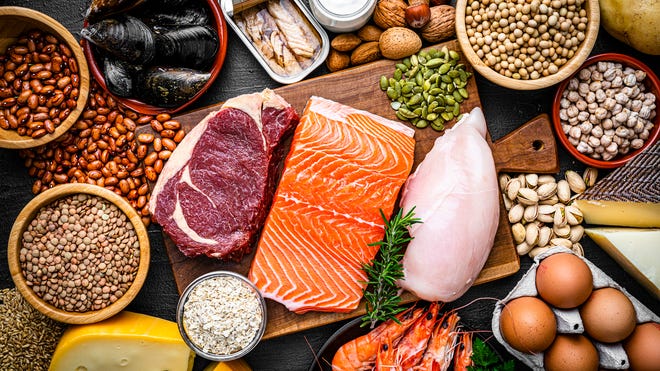So you’re trying to bulk up. How can boosting your protein intake boost your gym gains?
The Recommended Dietary Allowance (RDA) for protein is currently 0.36 grams of protein per pound, or about 54 grams for a person who weighs 150 pounds. But diet experts are increasingly pushing for consuming higher amounts of protein: upwards of 60 to 90 grams daily.
Registered dietitian Jamie Nadeau tells USA TODAY that she recommends getting “at least 20 grams of protein per meal for satiety,” though she notes everyone has different needs.
If you’re trying to build muscle, that amount could be even higher. But it is possible to overdo it on the protein. Here’s how nutrition experts recommend finding that happy medium.
How much protein to build muscle?
At minimum, people should be eating 0.8 grams of protein per kilogram of body weight, Nadeau says. That translates roughly to a minimum of 54.4 grams of protein a day for a person who weighs 150 pounds.
But if you’re trying to build muscle, adding more protein will aid in your body’s “growth, development, and tissue repair,” per Harvard Health.
“Everyone is different, but for most healthy individuals looking to build muscle, aiming for 1.2-1.4g per kg protein is helpful,” Nadeau says. In other words, a target of 81.6 to 95.2 grams for someone who weighs 150 pounds.
Boosting protein intake doesn’t have to be a complicated ordeal of tracking down a protein powder that you don’t find gross, or cooking enormous quantities of meat all the time. While many meats do offer much higher protein counts, other foods like lentils, greek yogurt, cottage cheese, milk, black beans and peanut butter do, too.
“To keep things simple, I recommend prioritizing a good protein source at every meal, and trying to include a snack at least once per day that has at least 5-10 grams of protein,” Nadeau says.
Looking to eat more protein?Consider adding chicken to your diet. Here’s why.
What are the symptoms of too much protein in the body?
There can be too much of a good thing, even when it comes to nutrition.
Eating a very high protein diet increases your risk of developing kidney stones, according to Harvard Health. And depending on what protein-rich foods you’re eating, large amounts of red meat or other foods higher in saturated fat can increase your risk of heart disease and colon cancer.
More:What is the best protein powder? Dietitian shares the ‘healthiest’ kind.
“It is definitely possible to eat too much protein,” Nadeau says. She recommends keeping protein intake under 2g/kg protein.
